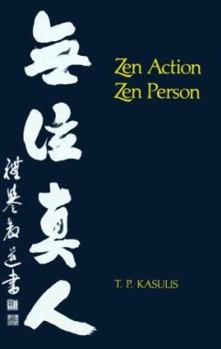Zen Action/Zen Person
Select Format
Select Condition 
Book Overview
"For the thoughtful Westerner this must be one of the most clear and perceptive accounts of Zen available. Thoroughly new is Kasulis' attempt to locate the Zen understanding of the person in secular Japanese assumptions." --Times Literary Supplement
Format:Paperback
Language:English
ISBN:0824810236
ISBN13:9780824810238
Release Date:January 1987
Publisher:University of Hawaii Press
Length:194 Pages
Weight:0.60 lbs.
Dimensions:0.6" x 5.4" x 8.4"
Customer Reviews
2 ratings
A clear, deep, and perceptive account of Zen.
Published by Thriftbooks.com User , 23 years ago
Some years ago I undertook a fairly extensive program of reading in Zen. Most of my Zen books have since disappeared. Only the choicest remain, among which is the Kasulis.For those who have assimilated their D. T. Suzuki and Alan Watts, who have substantial portions of the Prajnaparamita, Dogen, Hakuin, and Bankei under their belt, as well as a smattering of the great Chinese Masters such as Seng-ts'an, and who are now ready to get their teeth into some really deep analysis, I can heartily recommend 'Zen Action, Zen Person.'Its author, T. P. Kasulis, is a professional American philosopher who has trained in both Chinese and Japanese, in the Asian thought which preceded the development of Zen, and in Zen practice - essential requirements for anyone who wishes to really come to grips with the profound and sophisticated approach to reality that we refer to as Zen. Although, at just 177 pages, his book isn't a big book, it holds far more in its pages than many a much bigger one.It would take a professional student of philosophy, someone who was well up, not only on Asian thought, but also on such philosophers as Heidegger, to really do justice to this book. As a mere amateur, who nevertheless found the Kasulis extraordinarily interesting, I'll have to content myself here with describing its contents. The book falls into three parts:PART I / THE CONTEXT OF NOTHINGNESS. Chapter 1. The Cultural Setting : Context and Personal Meaning. 2. Nagarjuna : The Logic of Emptiness. 3. Chinese Taoism : The Pre-ontology of Nonbeing. 4. No-Mind : The Zen Response to Nothingness.PART II / PERSONAL MEANING IN ZEN PRACTICE. 5. Zen and Reality. 6. Dogen's Phenomenology of Zazen. 7. Dogen : Person as Presence. 8. Hakuin : The Psychodynamics of Zen Training.Part III / THE PERSON AS ACT. 9. Zen Action / Zen Person. 10. Philosophical Postscript : Toward a Zen Humanism.The book is rounded out with a brief section of Notes, a useful bibliography of Works Cited, a Glossary of Chinese and Japanese names (with sinographs courteously provided), and a 5-page Index.This book is full of good things. Chapter 2 on Nagarjuna, in particular, struck me as superb, though I also found lots to chew on in the other chapters. One would hope, however, that at some point the word "Emptiness" - as a translation of the original Sanskrit "sunyata" and its Chinese (_k'ung1_)and Japanese(_ku_) equivalents - is abandoned in favor of the word "Openness," a word which seems to better capture the meaning of "sunyata," and one that, because of its positive connotations, would be far less open to misunderstanding by Western readers. Think how much more meaningful, for example, the line "rupam sunyata sunyataiva rupam" of the Heart Sutra becomes, a sutra which had a very big influence on Zen, if read as "Form is Openness, Openness is Form."All serious students of Zen will want to have this book. They will find much more in it than many a more touted volume on Zen.
One of the Best Books Ever Written on Zen
Published by Thriftbooks.com User , 24 years ago
Dr. Kasulis has written a masterpiece on Zen Buddhism. A clear, perceptive view on Zen doctrine and Zen practice. Other essential book recommendations on Zen, are the books by Eugen Herrigel- "Zen and the Art of Archery" & "The Method of Zen".





